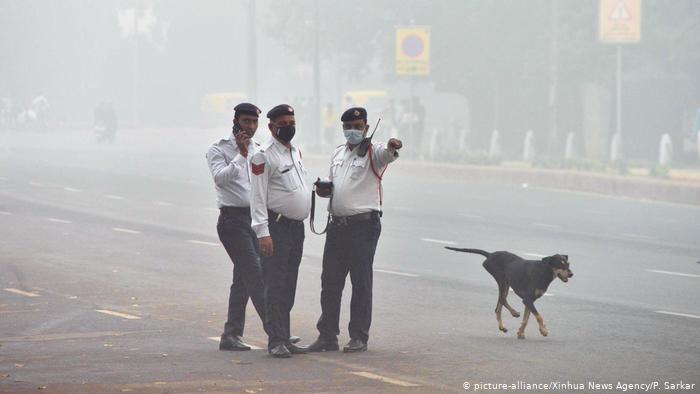The air in India's capital region becomes very polluted every winter. Vehicular and industrial pollutants, crop burning, and weather conditions cause the problem. Despite numerous initiatives, the problem has persisted.
Every year, the residents of India's capital region and surrounding areas experience hazardous levels of air pollution at the beginning of winter.
Smoke from stubble burning in the adjoining farmland areas of the states of Haryana and Punjab, as well as fumes from vehicles and industry, enshroud the city as lower temperatures and slower moving winds trap pollutants in the air.
On Monday, the air pollution in New Delhi was classed as severe for the fifth consecutive day.
The Central Pollution Control Board's air quality index recorded severe levels of pollution between 450 and 499 at monitoring centers in the city, with 500 the highest pollution level on the scale.
That score is more than 20 times the limit deemed safe by the World Health Organization (WHO) — it roughly equals smoking 25 cigarettes a day.
"A disadvantaged geographic location and regional meteorology with windy and dusty conditions during summer contributes greatly to Delhi's air pollution. This is particularly worsened by low relative humidity that increases particle resuspension," Prarthana Borah, India director for Clean Air Asia, told DW.
"In addition, there are episodic dust transport events from surrounding areas. As a land-locked megacity, there are limited avenues for the polluted air to be flushed out of Delhi. Nor is Delhi in the advantageous position of enjoying replacement of air from relatively unpolluted marine regions," she said.
COVID-19 worries
"Look at India, it's filthy. The air is filthy," said Donald Trump in the final US presidential debate, while justifying his stance on pulling the US out of the Paris climate deal. While his comments received a lot of backlash, experts warn that Delhi's air quality is bound to get worse as the festival season arrives in India.
Firecrackers during the Hindu festival of lights, Diwali, are expected to worsen air quality in mid-November.
A surge in COVID-19 cases, coupled with the rise in pollution, has made experts concerned about Delhi residents.
On Monday, Delhi recorded 7,745 new coronavirus cases, the highest daily number of infections in India.
Latest Stories
-
‘Golden Boy’ Abdul Karim Razak honored at WAFU-B general assembly
6 mins -
Buipewura Jinapor secures Vice Presidential position in National House of Chiefs with record votes
15 mins -
2024 election: I want results to come out like ‘milk and honey’ – Toobu
16 mins -
Ghana’s Henry Bukari hands over chairmanship of ECOWAS Brown Card Council of Bureaux
22 mins -
Residents of Dome-Kwabenya on edge ahead of December elections
52 mins -
Moffy drops new single ‘Wo’, blending culture and modernity
1 hour -
Don’t bring soldiers to polling stations – Martin Kpebu
1 hour -
Ogyeahohuo Yaw Gyebi II retained as President of National House of Chiefs
2 hours -
Embrace ICT to fit in digital world – Ho NYA boss to youth
2 hours -
We don’t want armed soldiers at polling stations – Tanko-Computer
2 hours -
Drama as police corner armed robbers inside locked forex bureau at Lapaz
3 hours -
NEIP CEO to Kwaku Manu: You can support any political party, but stop misbehaving in NPP colours
3 hours -
30% quota for less privileged shows Free SHS is inclusive – Ofosu Nkansah
3 hours -
Nigerian-born conquers childhood hearing loss to become KNUST’s overall best graduating student
3 hours -
ECOWAS Court orders compensation for violations against New Force’s Shalimar Abbiusi
3 hours

